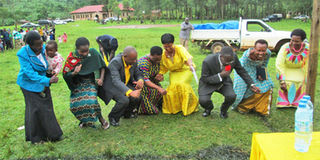Prime
Ugandan women not yet emancipated - legislator

MPs and residents dance during a belated Women’s Day celebrations for Ntungamo District at Kahunga Primary School last Friday. PHOTO BY PEREZ RUMANZI
What you need to know:
Questions. Mr Raphael Magezi says acts of domestic violence and abuse of women rights still exist
NTUNGAMO.
Igara West MP Raphael Magezi has said majority of Ugandan women are not yet emancipated and are still treated as lesser beings by men.
Speaking during a belated Women’s Day celebrations for Ntungamo District at Kahunga Primary School last Friday, Mr Magezi said fair treatment and justice still elude women.
He added that acts of domestic violence and abuse of women rights are common place.
“I am telling you that this ordinary woman here will never win a case in court. Talk about domestic violence; land has been grabbed; they have been chased away from their homes,” Mr Magezi said.
“When they go to police, they do not have money to give out as bribes; when they go to court, it’s the same story, we cannot celebrate as women when we have more women suffering,” he added.
The legislator cautioned women in leadership against celebrating as if a big percentage has been liberated. He asked them to endeavour to support all women and protect them in the face of injustices.
Mr Magezi also urged government to concentrate on healthcare service delivery in rural areas by remunerating medical personnel, delivering drugs and maintaining existing health centres for easy access by poor rural women.
State minister for Urban Planning Rose Najjemba, who was the chief guest, urged women not to fear competing with men for leadership positions and also asked government to activate women councils at all levels to create a way for women’s entry into leadership.
“There is no way women will be identified for leadership positions from the grassroots if women councils are not operational. This time, I think they must be elected as we are electing local councils,” Ms Najjemba said. “Many would-be women leaders are failing to come up because they do not have a forum; we ask government to speed up the process,” she added.
Women councils have not been functional since 2004 when the term of office of those elected in 1998 ended.
The effects
According to a 2011 study by the Centre for Domestic Violence Prevention and Makerere University Economic Policy Research Centre, about 60 per cent of families in Uganda are experiencing violence, whether sexual or gender-based.



